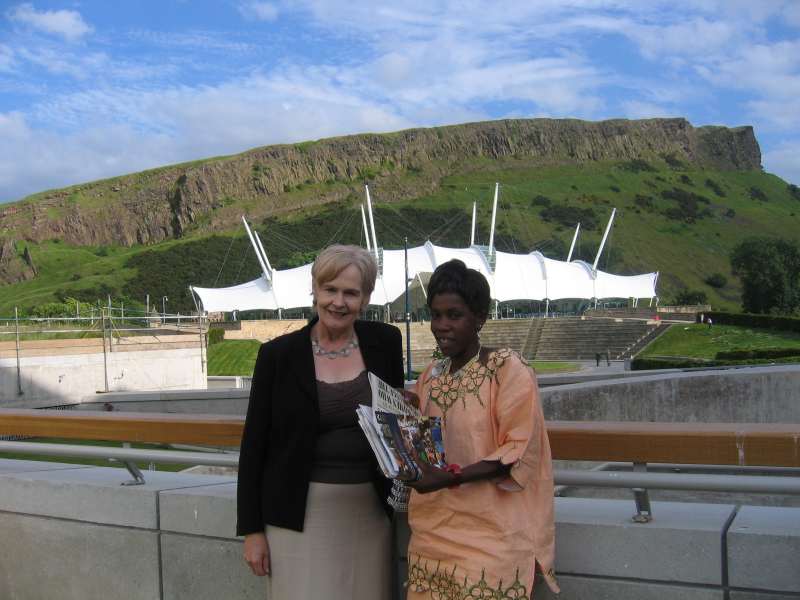17:07
17:13
Mary Scanlon (Highlands and Islands) (Con): I would like to thank
Christine Grahame for giving me the opportunity to speak in this debate on
the W8 summit. On behalf of all of us, I extend grateful thanks to Lesley
Riddoch for her commitment to women in Africa, for her role in addressing
poverty in Africa and for helping to bring us together as a group.
Christine Grahame, Maureen Macmillan and I attended the first sessions of
today's conference. We were fortunate to hear Hauwa Ibrahim give one of
the most moving and memorable speeches that I will ever hear in my life. I
also met Alivera Kiiza, who is in the gallery. Unfortunately, I was unable
to stay to hear her speak.
I would like to talk about Alivera Kiiza and the Cafédirect model of
making women farmers powerful in African co-operatives. She has overcome
many of the barriers that Trish Godman outlined. We should forget the old
days when Scots bought Fairtrade products because it was politically
correct to do so and not because it tasted good. Cafédirect and other
Fairtrade brands are winning awards for the quality of their teas, coffees
and chocolates and creating successful community enterprises that should
attract the attention of any passing G8 politician.
Cafédirect was created at the height of the coffee crisis in 1991, buying
direct from coffee growers and selling the pick of their crops to western
countries. A greater market share for Africans means less poverty in
Africa, and Oxfam estimates that, if Africa could increase its share of
world trade by only 1 per cent, that would generate five times more income
than it currently receives in aid and debt relief. However, developing
countries face tariffs that prevent them from trading freely in the west,
where our own farmers still receive large subsidies. Fair trade breaks
that cycle by giving growers a decent income for their crops while
ensuring that consumers enjoy high-quality products.
It took 10 years for men in the Karagwe District
Co-operative Union to take the radical and non-traditional step of making
their wives owners of trees. Karagwe is in the most remote region of
north-west Tanzania and the union represents 67 individual co-operatives
with more than 17,500 coffee farmers. Members of the KDCU were asked to
send three women and three men to Cafédirect producer partnership
workshops and the women soon spoke out. Although women do a lot of work on
the farms, the coffee crop traditionally belongs to men; women do not
often benefit directly from coffee sales. One woman told how she was
beaten by her husband when she asked what had happened to the money that
he got for selling coffee.
During a visit to the district, Cafédirect staff
spotted a young woman called Alivera Kiiza as someone with strong views on
women's empowerment. She agreed to help to facilitate the workshops and
was then chosen to address the Fairtrade conference in London. That made a
huge impact on her authority within the co-operative. This is what she
wrote when she returned to Karagwe:
"I am the first woman from my community here in Tanzania to go to the UK,
to go very far from my place. No woman has gone from here representing the
women of Karagwe until me. As a result, women farmers are joining their
co-operative societies. I tell them it is the women in UK who buy
Fairtrade products—I have seen this with my own eyes. I will encourage
women to sell the coffee they have in their own names instead of the names
of their husbands. They will become leaders of their co-operative
societies in the villages ... They will be able to solve their problems at
home without asking their husbands every time. They will become more
educated by going to seminars and workshops when they are coffee owners
themselves and members of their co-operatives. They will be able to buy
what they want themselves, they will have power, they will have a say."
I ask that, when members buy Cafédirect coffee, tea
and drinking chocolate in future, they think of Alivera Kiiza and the
women entrepreneurs in Tanzania. |
